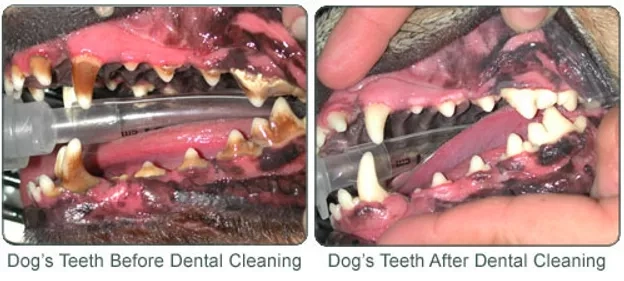Dental Disease does, quite simply, cause your pet severe pain and discomfort and may even shorten their life due to organ failure as a result of the constant bacterial attack on the liver, heart and kidneys from chronic gum infections.
It is estimated that 80% of pets over three years old will have some degree of dental or periodontal disease and by older age many pets will be in dire need of treatment to prevent pain, discomfort and premature death from undiagnosed and untreated dental disease.
The good news is that with a good diet (dry food!) and preventative care, dental problems are very easy to prevent. Your pet’s teeth will be checked at the Annual Health Assessment & Vaccination and your vet may recommend you come in for a dental check in the intervening months.
If your vet or veterinary nurse notices any tartar, gingivitis, periodontitis etc they will advise you on the best course of treatment. This will often include admitting your pet into the practice for a ‘dental’ to get things back to the way they should be. A dental entails general anaesthesia and removal of all the tartar and other ‘gunge’ from your pet’s teeth with an ultrasonic descaler.
Once this is done each tooth and its roots are examined individually and if required the tooth can be removed. Your pet will do fine with the tooth gone whereas with it there they may have problems very soon again and require another treatment. Finally the teeth are polished to smooth out any microscopic imperfections and help reduce the build-up of further tartar.
It's the exact same as is done on our teeth by the dental hygienist.
In general this is a day procedure and is done routinely. For older animals your practice will discuss doing pre-anaesthetic blood tests to ensure the risks are minimised.

In some cases where a pet hasn't been to a vet for a very long time or where the advice given by the vet was not followed we see very bad teeth and gum infections (periodontitis), requiring multiple extractions and courses of antibiotics. In extreme cases the infection has spread to the jaw bone and can cause it to fracture, or can also spread to other organs such as the kidneys, heart and liver causing organ failure, very serious illness and septicaemia (blood poisoning). These conditions - all stemming from neglected teeth - are life threatening. With regular check ups and following the advice we give you all of these serious complications will be avoided.
We occasionally see onset of serious dental problems in young dogs and cats where the owner is doing everything right - right food, good cleaning of teeth, getting them cleaned under anaesthetic when we advise. These serious medical conditions are genetic in origin and can be very challenging to treat. Essentially what is happening is that the immune system in the gums is over-reacting to a normal level of bacteria on the teeth causing a severe and refractory inflammation (stomata-gingivitis). The best way to treat it is to reduce the bacterial load to below what the body reacts to with regular cleaning, good home-care (using mouth rinses and gels) and frequent courses of antibiotics. Sometimes however this does not work and we get ongoing painful and serious problems. When this happens it can require complete removal of all or nearly all of the teeth. These cases require very in depth work-ups including blood tests, swabs for bacterial culture and antibiotic sensitivity testing, dental x-rays and taking biopsies of the gums.
In short, do not underestimate the importance of looking after your pets teeth. Prevention is better than cure – so daily brushing along with a good diet is the gold standard, and watchfulness will make sure that you spot any problems early. And do not ignore your vets advice if they say you pet needs their teeth cleaned.
Teeth brushing is not as difficult — or as daft — as it sounds and really is the best way to minimise any incidences of dental disease. In particular you should try to do it if your pet has just had or is just about to have a ‘dental’. Whilst your vet can get the teeth as clean as possible, it is then up to you to try to keep them that way, otherwise your pet will probably have to go back for future dental cleaning.
Don’t forget this is not your vet’s fault — all they can do is get the teeth as clean as possible, but from the next day they will start to get dirty again and will end up as bad as before the ‘dental’ unless you do your bit at home.